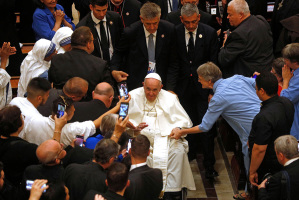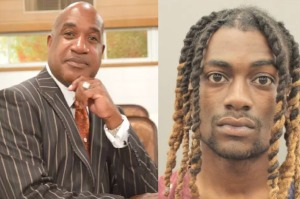Radical Music for Radical Times: Has Christian Music Gone Too Far?
Christian music today is not the same as a generation ago, with some easily crossing over to the secular realm and even heard in the clubs. Has Christian music gone too far or is it just meeting the people where they're at?
Kirk Franklin stated at the beginning of his 1997 song "Stomp," "For those of you who think that gospel music has gone too far, that we have gotten too radical with our message, well I got news for you, you ain't seen nothing yet."
Artists such as Kirk Franklin, TobyMac, Deitrick Haddon, Mary Mary, Israel Houghton – just to name a few – have made young Christians feel comfortable with combining the latest dance beats to their favorite gospel song.
"Jesus didn't hang out in the church," TobyMac told PBS' Religion & Ethics NewsWeekly. "He hung out with the people, where they were. And that's to me where Christian music should be."
The 55th annual Grammys on Feb. 10 was an indicator that the direction that gospel music is headed is well appreciated and respected. Matt Redman took home two Grammys for Best Contemporary song/Performance, along with Israel Houghton and Micah Massey, who also won Best Contemporary Christian Music.
There was no surprise that TobyMac's "Eye On It" won Best Contemporary Christian album while Mary Mary won Best song for "Go get It."
And now gospel artists are proving to be just as much of musical power players as their secular counterparts, sharing Top 100 Billboard space, selling out tours and exposing their musical and personal lives through reality television.
Yet, is the shift causing an even wider generational divide within the body of Christ? Older members view the new generation of music to be feeble and full of beats that drown out the message of the song, causing the listener to forget the message of Christ and only focus on the rhythm.
Lynette Parker, former worship leader at Calvary Baptist Church in Philadelphia, Pa., tends to agree that Christian music has become a bit radical. "Anytime you can hear 'It's the God in Me' played on secular radio stations or remixed for the club, that becomes problematic. There has to be a clear separation. There is a divide that has to be respected."
Many Christian music critics have discussed the issue that many artists have blurred lines collaborating with secular artists on Christian albums. Some critics feel that the enveloped is not pushed but torn into pieces. They question if the message has been convoluted by the messenger.
Christian rapper and hip-hop artist LeCrae also expressed to Religion & Ethics NewsWeekly how he feels about the issue. "Sometimes I'm too churchy for the world, I'm too worldly for the church and so I exist in this weird dichotomy, this weird place, but there's a lot of people like me and there's a lot of people who resonate with that."
Many church youth groups have come under attack by young Christians stating that there is an old familiar way of teaching that really does not work for the youth of today. With the social issues of sex, drugs, depression, mental illness, and everyday peer pressure, many youth find refuge in the lyrics of current gospel music.
Keshia Jackson, 16, loves gospel music. "The songs that are played deal with where I am now. They speak of things that I am dealing within my heart. I may not tell anyone what I am going through but then I will hear a song that expresses exactly how I feel. I still rock Jay Z, but when I need to be uplifted, there is nothing wrong with my gospel music that has a message that I can jam to."
Christian music will continue to take its shape and express new forms. The Christian body faces the dilemma of merging the two generations together to agree to speak different languages but receive the same message. "At the end of the day, it all glorifies Christ and that should be the focus," says Jackson.





























